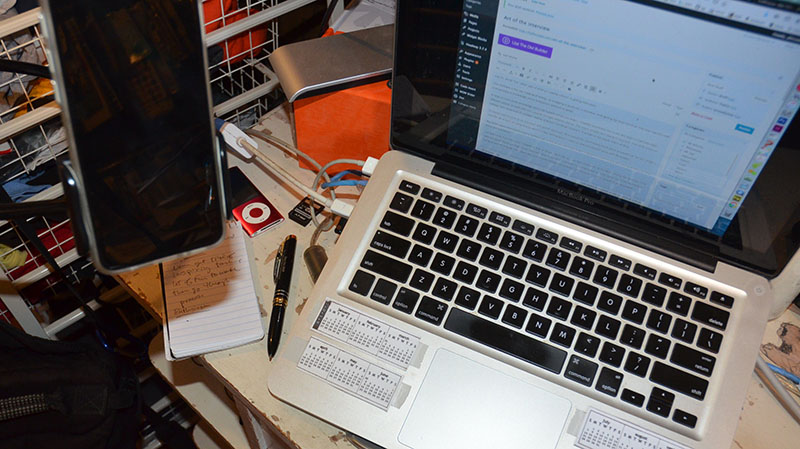 July 31, 2019–The “other” part of writing a weekly column is getting interviews.
July 31, 2019–The “other” part of writing a weekly column is getting interviews.
The interview is the raw material of writing, so snagging a good one is essential. And getting the most out of an interview requires both a broad base of knowledge and a compulsive attention to detail.
It helps to have some knowledge about the subject before you begin. I recently scrambled over a two-day span to interview eight different people on eight different subjects for eight different stories. The topics ranged from biking to business, from thrift shops to college, from wine tours to vinegar making, and from the Wright brothers’ first flight to the Apollo moon landing.
It’s easier now to bone up on a subject with online resources. And sometimes not knowing much about a subject can be your angle. I recently did a story on hang gliding, which I knew nothing about. It was fun learning about it along with the readers.
But what makes interviewing such a tightwire act is that as you are trying to ask intelligent questions you are also scrambling to keep track of the answers.
I’ve learned to have my phone charged up and on hands-free mode so I can type responses on my laptop during the interview. I’m a very fast typist (thank you high school elective). Most of the time I can build my article based on notes alone, using the recording to clarify or confirm a quote. This saves lots of time over transcribing the entire conversation. I’ve also learned to be redundant.
An established star like Larry Gatlin requires interviewers to have two recorders running. I still do that. I also keep an open spiral notebook, a pen, plus a pencil handy in case the computer freezes or the ink runs out. All those have happened.
The hardest part is to remember to listen. I always prep 8-15 questions to use as prompts, but often the conversation goes off in a tangent that proves more interesting. You have to be willing to follow it.
As words fly back and forth, I often neglect to capture the basics–name spellings, titles, dates, hours, contact information. So I try to start with that at the top of the interview. I like to offer some background about me, my familiarity with their work or the subject, and any connections no matter how tenuous. That builds rapport and lets them know how basic or advanced they can respond. I’m now more comfortable interrupting if I need a spelling, didn’t understand something, or require more explanation–it’s hard to interrupt Ray Price!
He was my first big “get.” I was nervous. I had grown up listening to him on the radio and watching him on TV. My first band played every Ray Price hit.
In his 80s at the time, Price had been asked every question over six decades. What do I ask him that hasn’t answered in thousands of other interviews or that couldn’t be found online?
Looking for advice, I turned to “Big G,” a veteran DJ at a local radio station who had interviewed the singer.
“Ask him about fishing,” Big G replied. “Ray Price loves to fish.”
A silly answer, I thought. But not really. The point was to get Ray Price to talk about what was interesting to him, and thereby learn something different about the man. I used this later while interviewing Mel Tillis on his bus. I learned he was a huge basketball fan, as am I. We watched a college game and had a spirited discussion about the sport. I got little I could use in an article about his music, but I got a nice story [Read Mel Tillis column here].
So how was the Ray Price interview? Nothing like I expected [Read Ray Price column here]. I was told by his management that I would have 20 minutes. As we passed the 42-minute mark and he was still talking I had to start dropping hints that I had other appointments and needed to get off the phone! I was the one to hang up on Ray Price!
I never did get to ask him about fishing. But I did learn he studied to be a veterinarian. That he was discovered while singing a demo as a favor for a college buddy. And that he is proud to claim credit for popularizing the “shuffle beat”–both the rhythm and the phrase.
After that, I didn’t fear talking to “stars.” These talented individuals got to where they are because of their charisma, charm, intelligence, and creativity. Otherwise I would not be interviewing them. I am immensely grateful to be in a position to have those conversations, then share them with readers and fans.